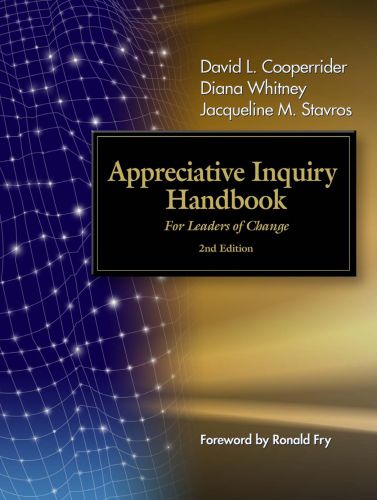David L. Cooperrider, Diana Whitney, and Jacqueline M. Stavros, Appreciative Inquiry Handbook: for Leaders of Change, 2nd Edition. Berrett-Koehler Publishers, 2008.
Referenced in: Strategies for Church Renewal – Whole Systems, Large Groups
LifeandLeadership.com Summary
This book discusses Appreciative Inquiry (AI), a Whole Systems approach to organizational renewal that has been useful in many churches. Cooperrider is the father of AI. Here he teams with two other renowned AI scholar-practitioners, Dianna Whitney and Jacqueline M. Stavros, to produce the closest thing to an AI encyclopedia one may find. As such, it is indispensable for those who may be exposed to AI through other resources and need to learn more. They describe what AI is and how it works, and offer sample project plans, designs, agendas, course outlines, interview guidelines, participant worksheets, a list of resources and more. It is doubtful one could have a question about AI that is not addressed in this book. See the Resource Guide for other suggestions on AI and other Whole Systems approaches.
From the Publisher
Every organization has something that works right-things that give it life when it is vital, effective, and successful. Appreciative Inquiry begins by identifying this positive core and connecting organizational visions, plans, and structures to it in ways that heighten energy and inspire action for change.
In this thoroughly revised and updated edition of one of the most popular change methods in the world, Cooperrider, Whitney and Stavros:
- Track the recent changes in the field, including some of the longest-running AI change efforts
- E xplain how AI has contributed to sustainability and the triple bottom line.
The Premium Edition contains the illustrative CD-ROM. The AI Handbook contains everything needed to launch any kind of AI initiative, from a one-hour introduction to AI to a complete two-day program. From abstract principles underlying AI to actual tools used in different settings, from detailed descriptions of AI interventions to practical tips to classic AI articles, the authors have amassed in one place all of the introductory concepts, examples, and aids necessary to engage yourself and others in Appreciative Inquiry as a change process.
About the Authors
David L. Cooperrider, PhD, is professor and chair of the program on business as an agent of world benefit at Case Western University. Diana K. Whitney, PhD, is the author of five books on AI, including The Power of Appreciative Inquiry.
Diana Whitney is an American author, award-winning consultant and educator whose writings – 15 books and dozens of chapters and articles – have advanced the positive principles and practices of appreciative inquiry and social constructionist theory worldwide. Her work as a scholar practitioner has furthered both research and practice in the fields of appreciative leadership and positive organization development. She was awarded Vallarta Institute’s Annual 2 X 2 Recreate the World Award. She is President of the Corporation for Positive Change, a Fellow of the World Business Academy, and a Founder and Director Emeritus of the Taos Institute.
Jackie Stavros possesses sixteen years of strategic planning, marketing, international and training experience. She has traveled to over a dozen countries in Asia, Europe and North America. Jackie has spent the last eight years incorporating Appreciative Inquiry (AI) methodologies into her training and consulting work. She is an Associate Professor for the Graduate College of Management, Lawrence Technological University where she teaches and integrates Appreciative Inquiry in her Leading Organizational Change and Strategic Management courses.
***For additional information on this resource, including reviews, click the bookstore links. Check the reference at page top or the links below for resource guides on related topics.***
See Resources on Over 100 Areas of Ministry Leadership:


